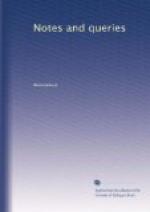“Bis in anno, videlicet, tempore yemali, pilliola furrata pellura minuti varii et bogeti, et quedam non furrata; et tempore estivali totidem pilliola lineata de sindone, et quedam non lineata, unicuique de Curia Scaccarii predicti, tam minoribus quam majoribus, secundum gradus, statum, et officium personarum predictarum, que expense se extendunt annuatim ad ... x ii.”
“Item sunt alie expense facte in Curiis Regis annuatim pro officio generalis procuratoris in diversis Curiis Regis, que de necessitate fieri oportet, pro brevibus Regis, et Cartis impetendis, et aliis, negociis in eisdem Curiis expediendis, que ad minus ascendunt per annum, prout evidencius apparet, per compotum et memoranda dicti fratris de Scaccario qui per capitulum ad illud officium oneratur ... lx m.”
“Item in donis dandis
in Curiis domini Regis et aliorum magnatum
pro favore habendo
et pro placitis defendendis, et expensis
parlialmentorum, ad minus
bis per annum ... cc m.”
I have made these extracts somewhat more at length than may, perhaps, be to the point in question, because they contain much that is highly interesting as to the apparently questionable mode in which the Hospitallers obtained the protection of the courts (and probably they were not singular in their proceedings); annual pensions to judges, besides other largesses, and much of this “pro favore habendo,” contrasts painfully with the “spotless purity of the ermine” which dignifies our present age.
In the “extent” we have occasionally a grange held rent free for life by a judge. Chief Justice Geffrey de Scrop so held that of Penhull in Northumberland.
Putting all these facts together, and bearing in mind that, throughout this elaborate “extent,” there are neither profits nor rent entered, as for the Temple itself, so that it seems to have then been neither in the possession nor occupation of the Hospitallers, is it not possible that they had alienated it to the lawyers, as a discharge for these heavy annual incumbrances,—prospectively, perhaps, because by the entry of these charges among the “reprise,” the life interests, at all events, were still paid; or perhaps the alienation was itself made to them “pro favore habendo” in some transaction that the Hospitallers wished to have carried by the Courts; or it may have been made as a bona fide bribe for future protection. At all events, when we see such extensive payments made annually to the lawyers, their ultimate possession of the fee simple is no unnatural result. But, as I am altogether ignorant of the history of the New Temple, I must refrain from suggestions, giving the simple facts as I find them, and leaving the rest to the learning and investigation of your correspondent.
L.B.L.
* * * * *
STRANGERS IN THE HOUSE OF COMMONS.
(Vol. ii., pp. 17. 83.)




